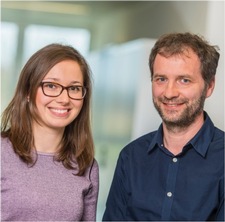Key Switch in the Immune System Regulated by Splicing

Isabel Meininger and Prof. Dr. Daniel Krappmann Source: Helmholtz Zentrum München
The protein MALT1 (mucosa-associated lymphoid tissue lymphoma translocation protein 1) controls the activation of lymphocytes and thus the immune response following bacterial or viral infections.
For this purpose, the protease cleaves other proteins in the cell and is considered a potential target for the treatment of excessive immune responses as observed in autoimmune diseases (e.g. multiple sclerosis) or distinct malignant lymphomas.
To prevent an overshooting MALT1 activity, a team at the Research Unit Cellular Signal Integration (AZS) at Helmholtz Zentrum München is investigating which steps in this signaling chain are feasible for a pharmacological targeting. In the current study, the team led by Prof. Dr. Daniel Krappmann, head of the AZS Research Unit, focused on the two variants MALT1A and MALT1B, which arise through alternative splicing*.
Stronger activation of T cells
“To our surprise, we showed that MALT1 is regulated by posttranscriptional splicing,” said first author Isabel Meininger, a doctoral student at Helmholtz Zentrum München. “Depending on which MALT1 variant is expressed, the immune system activated is more or less,” she added.
Specifically, the scientists observed that MALT1A resulted in a stronger stimulation of T cells than MALT1B. According to the study, a molecule called hnRNP U (heterogeneous nuclear ribonucleoprotein U) regulates which of the two isoforms is preferably expressed. If it is present in only small amounts, higher levels of MALT1A are expressed, resulting in stronger activation of the T cells. However, if the quantity of hnRNP U is increased, higher levels of MALT1B are expressed and the response of the T cells is weaker.
“Our findings contribute to a better understanding of the function of MALT1 and enable us to better assess the potential impact of a pharmacological effect on this promising drug candidate,” said Krappmann. In previous studies he and his team already identified first pharmacological substances with which the function of MALT1 can be specifically altered. In future studies, the researchers want to confirm in a preclinical model the effects of MALT1 splicing on the immune system and the development of diseases.
Further Information
Background:
* Alternative splicing refers to a process in which a copy of a gene, the pre-mRNA, is spliced differently. Thus, several alternative RNA sequences can be generated that as a consequence lead to different proteins. In the case of MALT1 the variants A and B differ only through the presence of a short sequence that encodes eleven amino acids. If this region is missing, as in the case of MALT1B, this leads to an impaired ability to stimulate T cells.
Original Publication:
Meininger, I. et al. (2016). Alternative splicing of MALT1 controls signaling and activation of CD4+ T cells, Nature Communications, DOI: 10.1038/NCOMMS11292
The Helmholtz Zentrum München, the German Research Center for Environmental Health, pursues the goal of developing personalized medical approaches to the prevention and therapy of major common diseases such as diabetes and lung disease. To achieve this, it investigates the interaction of genetics, environmental factors and lifestyle. The Helmholtz Zentrum München has about 2,300 staff members and is headquartered in Neuherberg in the north of Munich. It is a member of the Helmholtz Association, a community of 18 scientific-technical and medical-biological research centers with a total of about 37,000 staff members. The Helmholtz Zentrum München is a partner in the German Center for Diabetes Research. http://www.helmholtz-muenchen.de/en/index.html
The Research Unit Cellular Signal Integration (AZS) at the Institute of Molecular Toxicology and Pharmacology conducts research for a better understanding of cellular communication. In doing so, it focuses on the interaction of protein complexes and the effects of posttranslational modifications. The aim of this research is to elucidate the faulty regulation of the signaling chains in the immune system, which may contribute to the development of infectious diseases, lymphoma and autoimmune diseases, and to modulate these processes pharmacologically. http://www.helmholtz-muenchen.de/en/azs/index.html
Scientific contact at Helmholtz Zentrum München
Prof. Dr. Daniel Krappmann, Helmholtz Zentrum München – German Research Center for Environmental Health (GmbH), Research Unit Cellular Signal Integration, Ingolstädter Landstr. 1, 85764 Neuherberg – Tel.: +49 89 3187-3461, E-mail: daniel.krappmann@helmholtz-muenchen.de
Media Contact
All latest news from the category: Materials Sciences
Materials management deals with the research, development, manufacturing and processing of raw and industrial materials. Key aspects here are biological and medical issues, which play an increasingly important role in this field.
innovations-report offers in-depth articles related to the development and application of materials and the structure and properties of new materials.
Newest articles

Superradiant atoms could push the boundaries of how precisely time can be measured
Superradiant atoms can help us measure time more precisely than ever. In a new study, researchers from the University of Copenhagen present a new method for measuring the time interval,…

Ion thermoelectric conversion devices for near room temperature
The electrode sheet of the thermoelectric device consists of ionic hydrogel, which is sandwiched between the electrodes to form, and the Prussian blue on the electrode undergoes a redox reaction…

Zap Energy achieves 37-million-degree temperatures in a compact device
New publication reports record electron temperatures for a small-scale, sheared-flow-stabilized Z-pinch fusion device. In the nine decades since humans first produced fusion reactions, only a few fusion technologies have demonstrated…





















